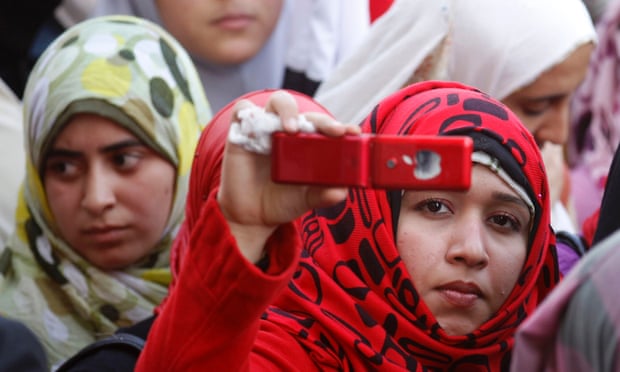By Dr Shereen El Feki
The social media site offers young women in the Middle East the chance to talk about sex openly.
Al Hubb Thaqafa offers young people access to an agony aunt and Q&A sections to discuss menstruation, contraception and sex without judgement. Photograph: Peter Andrews/Reuters
The social media site offers young women in the Middle East the chance to talk about sex openly without criticism.
The Middle East is not known for frank, open and mature discussions about sex, but a social media platform is hoping to change that. Al Hubb Thaqafa offers young people, particularly girls, straight talk on sex, love and relationships in Arabic. The name means “love is culture” and the site aims to tackle taboos surrounding sex by offering visitors not just the facts of life, but also a chance to ask questions, express opinions and debate with one another – opportunities still rare in Egypt and the wider Arab world, when it comes to sexuality.
The formula has proved hugely successful; since its launch almost a year ago, Al Hubb Thaqafa’s main website has received more than 3m views, mainly from Egypt and Saudi Arabia, with almost a quarter of a million users following the the complementary Facebook page and Twitter feed.
Al Hubb Thaqafa is part of Love Matters, a collection of similar platforms targeting audiences in half a dozen languages and markets around the world. They’re run by Radio Netherlands Worldwide as a media development project, part of a wider remit to encourage freedom of expression and human rights.
“What you see most often is that sexual reproductive health programmes online and offline solely focus on avoiding sexually transmitted diseases and unwanted pregnancies,” says Michelle Ernsting, head of Love Matters. “Both are important for young people, but these are not what draw people to sex. Young people have sex because it feels good. So why not use pleasure, love and relationships as the way to address taboos?”
This pleasure principle has been rolled out across half-a-dozen websites since 2010, targeting audiences in India, Kenya, China, Mexico and Venezuela – and now Egypt. There is no shortage of sexual context accessible to internet users in the Middle East – Pakistan, Egypt and Iran top the Google league tables for sex-related searches – but material available in Arabic tends to be either pornographic or puritanical with nothing in between.
Given the absence of sex education in schools, and general reticence within families to broach such a matters, young people are largely at a loss when it comes to accurate information and advice to help them navigate their sexual lives. Much of Al Hubb Thaqafa’s main website consists of the nuts and bolts of sex and reproduction, but its most interesting and popular pages take visitors far beyond.
Local bloggers tackle taboos head on through their own experiences; one fascinating post by a male contributor puts the “men” into “menstruation” by recounting his own shopping adventure buying sanitary pads for his sister, and asks what makes this basic bit of biology so culturally awkward. Online agony aunt Marwa Rakha tackles visitors’ predicaments from straight-up heartbreak to the finer points of BDSM. Discuss with Me asks visitors to vote on hot topics, from polygamy to homosexuality, and explain their positions. In a society where keeping up appearances means that women often hesitate to talk about sex – even with their husband – the chance for a free and frank exchange with men on such matters is, for many, unprecedented.
Indeed, women are in charge at Al Hubb Thaqafa: its editorial team, many of its contributors and almost half of its Facebook followers are female. There are few more remarkable sights in the Arab region than that of a woman showing male viewers how to roll on a condom (indeed, women showing men how to do anything is notable in its own right), but this is exactly what Alyaa Gad, an Egyptian sexologist, tackles, and more, in a series of hugely popular videos on the platform’s YouTube channel, which have attracted more than 5m views since launch.
So far, reaction from the region has been enthusiastic – the usual fatwas that condemn any challenge to the sexual status quo as a corruption of “traditional” values have yet to be flung. The creators of Al Hubb Thaqafa are keen to keep it that way, and in their choice of topics, use of language and selection of images, walk a fine line between awakening, and shocking, their audience.
We haven’t seen as free and frank an exchange on sexuality in the region since the golden age of Arabic erotica a millennium ago. The climax of the Arab Spring may be a distant memory, but Al Hubb Thaqafa and its newfound freedom of expression is a welcome sign of things to come.
Dr Shereen El Feki is the author of Sex and the Citadel: Intimate Life in a Changing Arab World. Follow @shereenelfeki on Twitter.


